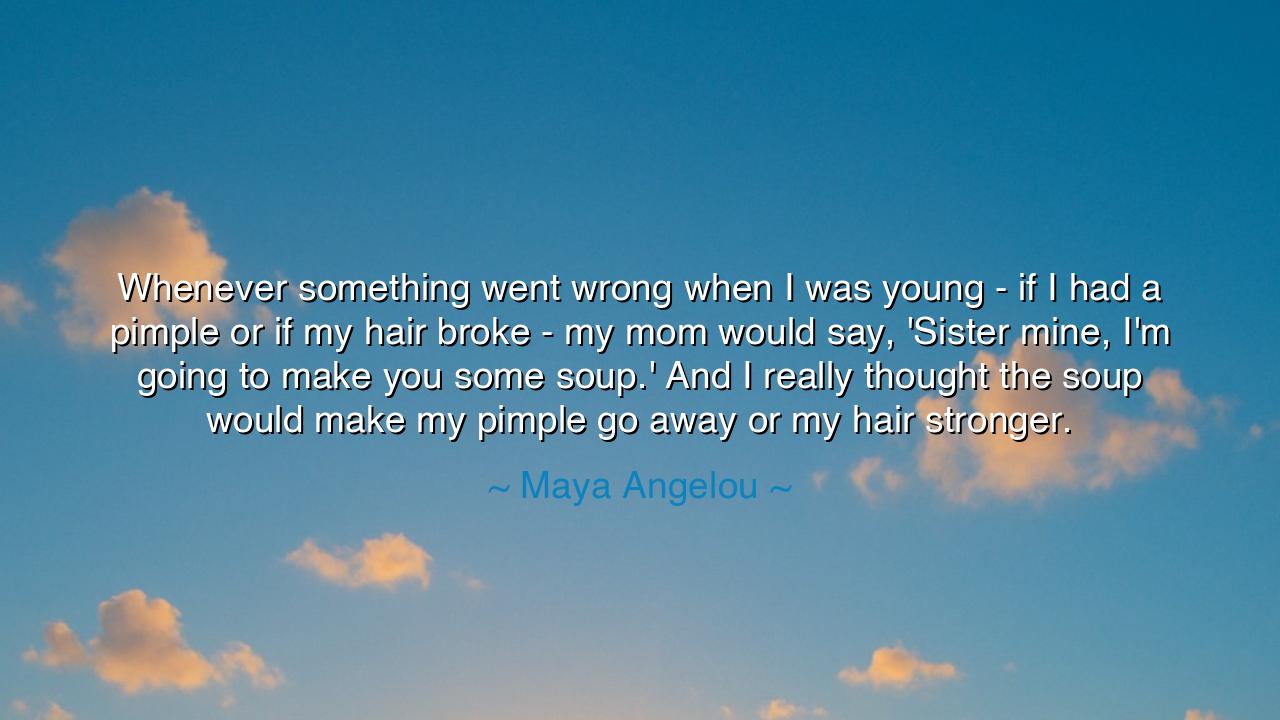
Whenever something went wrong when I was young - if I had a
Whenever something went wrong when I was young - if I had a pimple or if my hair broke - my mom would say, 'Sister mine, I'm going to make you some soup.' And I really thought the soup would make my pimple go away or my hair stronger.






The words of Maya Angelou, “Whenever something went wrong when I was young—if I had a pimple or if my hair broke—my mom would say, ‘Sister mine, I’m going to make you some soup.’ And I really thought the soup would make my pimple go away or my hair stronger,” are not merely a fond recollection of childhood. They are a sacred remembrance of love’s quiet power, of the healing that flows not from medicine, but from care. Beneath this tender anecdote lies an eternal truth: that the deepest wounds of the human spirit are not cured by logic or by remedy, but by the warmth of another soul’s compassion.
To understand Angelou’s words, one must hear the music behind them — the rhythm of a mother’s love, the poetry of comfort disguised as something simple. The soup her mother made was more than food; it was symbol and sacrament. It said, without words, “You are loved, you are safe, and no pain, however small, will go unanswered.” To a child, such gestures are miracles. They teach that the world, though harsh and uncertain, still contains gentleness. And this lesson, once planted in the heart, grows into strength. It is why Maya Angelou, who would one day speak to millions, carried such quiet grace — because once, long ago, she was fed not only by soup, but by tenderness.
The ancients would have recognized the holiness of such an act. Among them, food was not merely sustenance, but a ritual of healing. In the old villages, when the body or the heart was wounded, the elders gathered to cook — not because they believed the herbs alone would mend the soul, but because the act of nurturing itself was sacred. Love transforms the ordinary into medicine. This is what Maya’s mother knew, whether consciously or through instinct. The soup healed because it carried love, and love, the ancients said, is the only true alchemy.
History too has shown that healing often begins in kindness, not in science. Consider Florence Nightingale, the Lady with the Lamp, who tended to the soldiers of war. She could not always save them from death, but her presence — her gentle words, her care, her hands — brought peace to their pain. The men under her care said her light was the last thing they saw before sleep, and in that glow, they felt safe. Like Maya’s soup, her compassion was a medicine beyond the flesh. It cured not the wound, but the despair that makes wounds unbearable.
Angelou’s story also reminds us of something forgotten in our age of rush and remedy — that healing begins with connection. A mother making soup for her daughter is an act of faith in wholeness. It says, “You are not alone in this pain.” And so the child believes — not only in the soup’s magic, but in her own worthiness to be cared for. This belief, this trust, is what allows the soul to mend. The true miracle, then, is not that Maya’s pimple might fade, but that she learned early the language of comfort, which she would later speak to the world through her poetry.
But there is deeper wisdom still. The soup, simple as it was, teaches us that love does not need grandeur to be powerful. Small acts, done with great tenderness, have the power to soothe the weary and heal the unseen. A kind word, a hand upon the shoulder, a meal shared in silence — these are the oldest remedies known to humankind. The ancients would say that such gestures are the hands of the divine moving through human hearts. For every time one person tends to another’s pain, the world itself grows a little less cold.
Thus, the lesson we inherit from Maya Angelou and her mother is this: when someone suffers, offer warmth, not solutions. You may not be able to fix their pain, but you can ease its weight. When your friend despairs, make them tea; when your child weeps, hold them close; when your own heart breaks, nourish yourself gently. Healing is not always about curing — sometimes it is about caring.
So, children of tomorrow, remember: every act of love is a kind of medicine. Maya’s mother healed her daughter not through power, but through presence. Let this truth guide you — that in the face of life’s small sorrows and great tragedies alike, your tenderness is enough. For the soul, like the body, hungers most for comfort — and often, a bowl of soup given with love can heal more than a thousand remedies without it.






AAdministratorAdministrator
Welcome, honored guests. Please leave a comment, we will respond soon